[Dec 2007, Volume 4 Quarterly Issue] Pdf File size - The IIPM Think ...
[Dec 2007, Volume 4 Quarterly Issue] Pdf File size - The IIPM Think ...
[Dec 2007, Volume 4 Quarterly Issue] Pdf File size - The IIPM Think ...
Create successful ePaper yourself
Turn your PDF publications into a flip-book with our unique Google optimized e-Paper software.
MORE MARKETS, LESS GOVERNMENT<br />
been in operation in many parts of the<br />
world including India. Although informal<br />
water markets have been in existence for<br />
decades, formal markets with clearly assigned,<br />
private and transferable water<br />
rights are of relatively recent origin. In<br />
Chile, Western USA and Australia, where<br />
there are developed formal water markets,<br />
there have been significant gains from water<br />
trading, particularly from trades between<br />
agricultural and urban users as water<br />
gets reallocated to more productive<br />
uses. In many instances, water trading has<br />
alleviated water shortages. International<br />
experience also shows that formal and developed<br />
water markets strengthen the incentives<br />
for conservation and more efficient<br />
use of water. For example, farmers<br />
have responded by switching to water-saving<br />
technologies and high-value, less water<br />
intensive crops. <strong>The</strong> Indian experience<br />
with water markets has been positive, although<br />
there have been only limited gains<br />
as markets have remained informal, localised<br />
and primitive. Thus, while these markets<br />
have led to some efficiency gains and<br />
have expanded the scope for many resource-poor<br />
farmers to access irrigation,<br />
inter-sectoral water transfers have not<br />
taken place so far. <strong>The</strong> current challenge<br />
in India is therefore to establish formal<br />
water markets, which will expand the scope<br />
of trading and make inter-sectoral water<br />
transfers possible. Further, since formal<br />
water markets have a legal basis, effective<br />
regulation can be designed to address the<br />
issue of ecological sustainability. <strong>The</strong>se<br />
markets will be of significant relevance to<br />
the urban sector, which has been suffering<br />
from acute shortages of water, but has not<br />
been able to access informal markets. A<br />
formal water market has the potential to<br />
provide low cost solutions to augmentation<br />
of water supply relatively quickly. With respect<br />
to further steps, it is desirable to<br />
make an indepth analysis on various important<br />
questions like<br />
• What are the legitimate users that need<br />
to be protected in water transaction?<br />
• Should third parties have to take into<br />
account the economic losses caused by<br />
not allowing the transfer?<br />
References<br />
• Dhawan, B.D. (1995), “Groundwater<br />
depletion, Land Degradation and Irrigated<br />
Agriculture in India. New Delhi:<br />
Commonwealth Publishers<br />
• Easter, K. William, Ariel Dinar and<br />
Mark W. Rosegrant. 1998. “Water Markets:<br />
Transaction Costs and Institutional<br />
Options,” in K.W. Easter et al. (eds.),<br />
Markets for Water: Potential and<br />
• Performance, Kluwer, Dordrecht, <strong>The</strong><br />
Netherlands.<br />
• Shah, Tushaar. 1993. Groundwater Market<br />
and Irrigation Development, Mumbai,<br />
Oxford University Press.<br />
• Hearne R., 1995. <strong>The</strong> Market Allocation<br />
of Natural Resources: Transaction<br />
of Water Use in Chile. Ph.D Dissertation,<br />
Department of Applied Economics,<br />
University of Minnesota.<br />
• Garrido, (1997). An Economic Analysis<br />
of Water Markets within the Spanish<br />
Agricultural Sector: Can they Provide<br />
Substantial Benefits? In K.W. Easter et<br />
al. (eds.), Markets for Water: Potential<br />
and Performance, Kluwer, Dordrecht,<br />
<strong>The</strong> Netherlands.<br />
• Government of India. (2002): “National<br />
Water Policy”, Ministry of Water Resources,<br />
New Delhi, India<br />
• Government of India. (1987): “National<br />
Water Policy”, Ministry of Water Resources,<br />
New Delhi, India<br />
• Government of Gujarat. (1999): “White<br />
Paper on Water Policy”, Ministry of<br />
Water Resources, Government of Gujarat,<br />
Gujarat.<br />
• Haddad, Brent M. 2000. Rivers of<br />
Gold: Designing Markets to Allocate<br />
Water in California, Island Press,<br />
Washington, DC.<br />
• Hearne and Easter (1997). <strong>The</strong> Economic<br />
and Financial Gains from Water<br />
Markets in Chile. In K.W. Easter et al.<br />
(eds.), Markets for Water: Potential and<br />
Performance, Kluwer, Dordrecht, <strong>The</strong><br />
Netherlands.<br />
• Holden, Paul and Mateen Thobani.<br />
1996. “Tradable Water Rights: A Property<br />
Rights Approach to Resolving Water<br />
Shortages and Promoting Investment”,<br />
Policy Research Working Paper<br />
-1627, World Bank, Washington, DC.<br />
• Meinzen-Dick (1997) Groundwater<br />
Markets in Pakistan: Institutional Development<br />
and Productivity Impacts. In<br />
K.W. Easter et al. (eds.), Markets for<br />
Water: Potential and Performance, Kluwer,<br />
Dordrecht, <strong>The</strong> Netherlands.<br />
• Pathak Jharna (<strong>2007</strong>). Irrigation Management<br />
Transfer: Problems and Policies.<br />
A Ph.D thesis submitted to Gujarat<br />
University.<br />
• Rosegrant, Mark W. and Hans P. Binswanger.<br />
1994. “Markets in Tradable<br />
Water Rights: Potential for Efficiency<br />
Gains in Developing Country Water<br />
Resource Allocation,” World Development,<br />
22(11): 1613-1625.<br />
• Sampath, R.K. 1992. “<strong>Issue</strong>s in Irrigation<br />
Pricing in Developing Countries”,<br />
World Development, 20(7): 967-977.<br />
• Vaidyanathan, A. (1999). Water Resource<br />
Management: Institutions and<br />
Irrigation Development in India. New<br />
Delhi: Oxford University Press.<br />
THE INDIA ECONOMY REVIEW<br />
101


![[Dec 2007, Volume 4 Quarterly Issue] Pdf File size - The IIPM Think ...](https://img.yumpu.com/29766298/100/500x640/dec-2007-volume-4-quarterly-issue-pdf-file-size-the-iipm-think-.jpg)
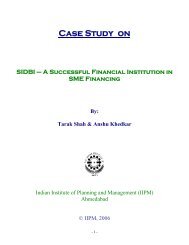
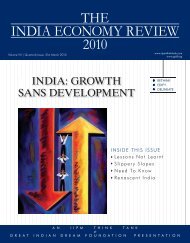
![[Feb 2008, Volume V Annual Issue] Pdf File size - The IIPM Think Tank](https://img.yumpu.com/43961117/1/190x245/feb-2008-volume-v-annual-issue-pdf-file-size-the-iipm-think-tank.jpg?quality=85)
![[June 2008, Volume V Quarterly Issue] Pdf File size - The IIPM Think ...](https://img.yumpu.com/41693247/1/190x245/june-2008-volume-v-quarterly-issue-pdf-file-size-the-iipm-think-.jpg?quality=85)
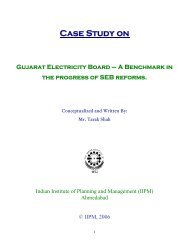
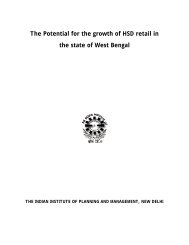
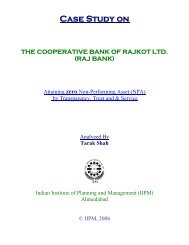
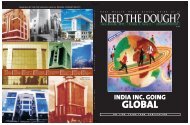
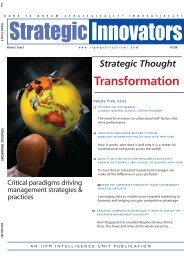
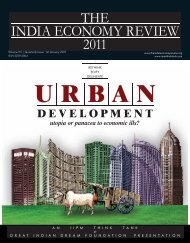
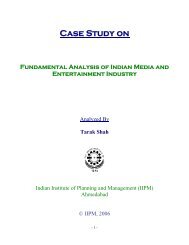
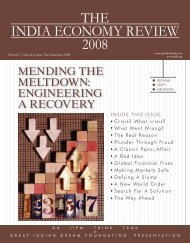
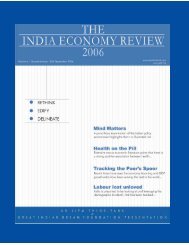
![[Volume VI | Quarterly Issue: 31st May 2009] Pdf File size](https://img.yumpu.com/27796051/1/190x245/volume-vi-quarterly-issue-31st-may-2009-pdf-file-size.jpg?quality=85)